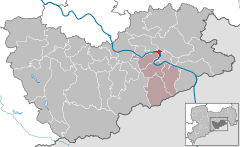Rathen
| Rathen | ||
|---|---|---|
 |
||
|
||
| Coordinates: 50°57′N 14°05′E / 50.950°N 14.083°ECoordinates: 50°57′N 14°05′E / 50.950°N 14.083°E | ||
| Country | Germany | |
| State | Saxony | |
| District | Sächsische Schweiz-Osterzgebirge | |
| Municipal assoc. | Königstein/Sächs. Schweiz | |
| Government | ||
| • Mayor | Thomas Richter | |
| Area | ||
| • Total | 3.58 km2 (1.38 sq mi) | |
| Population (2015-12-31) | ||
| • Total | 341 | |
| • Density | 95/km2 (250/sq mi) | |
| Time zone | CET/CEST (UTC+1/+2) | |
| Postal codes | 01824 | |
| Dialling codes | 035024 | |
| Vehicle registration | PIR | |
| Website | Official website | |
Rathen is a village in the Elbe Sandstone Mountains, in Saxony, Germany, about 35 km southeast of Dresden on the Elbe River. Rathen has between 400 and 500 inhabitants.
Rathen is a popular tourist destination, the main sights are the Bastei cliffs, the Amselsee (a lake), and the outdoor theater "Felsenbühne Rathen".
The Rathen Ferry, a passenger reaction ferry, connects Niederrathen, on the right bank of the Elbe river, to Oberrathen on the left bank. Kurort Rathen railway station, on the Dresden S-Bahn and the Dresden to Prague railway, is adjacent to the Oberrathen ferry terminal. Rathen is also a stop for the paddle steamers operating between Dresden and the Czech border.
Rathen was founded in the 13th century around 1261 as place for a castle fortress.
During World War II, a subcamp of Flossenbürg concentration camp was located here.
The state-recognised climatic spa of Rathen is not only the base for tours in the western part of Saxon Switzerland, but also for the world-famous Bastei rocks. Other popular destinations in the local Amselgrund valley are the lake of Amselsee and the Rathen Open Air Stage. There are a good 400 inhabitants on both sides of the Elbe, linked by a historic reaction ferry, that is a protected monument. In addition to the Old Mill of 1567, which was nearly demolished after the hundred year flood, there is a range of other timber-framed houses.
...
Wikipedia




